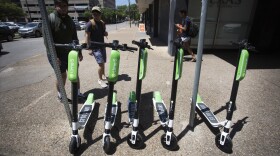A decision expected soon from the state Supreme Court could hobble Austin's ability to regulate plastic bag litter and contamination.
At issue is the meaning of the words “solid waste management” in the Texas Health and Safety Code. The code says that local governments in Texas may not “prohibit or restrict, for solid waste management purposes, the sale or use of a container or package in a manner not authorized by state law.”
As more Texas cities enact bans on single-use plastic bags given away at grocery stores, opponents cited the language to argue the bans are illegal.
The Texas Supreme Court is expected to rule on the case, Laredo Merchants Association v. The City of Laredo, by the end of the month.
“The potential for a patchwork of … ordinances to be scattered across the state is very onerous on businesses that serve a multitude of markets,” said George Kelemen, president of the Texas Retailers Association, a group that supports the Laredo Merchants Association in the lawsuit.

But cities argue they have good reason to limit the availability of single-use plastic bags. They say “solid waste management” refers to regulating the stream of garbage heading to a landfill, and that’s not what these bans are about.
“The town of Fort Stockton is a pretty conservative community, but the plastic bags were getting in the cattle feeders and choking the cows,” said Bennett Sandlin, head of the Texas Municipal League, which supports the City of Laredo in the case.
South Padre Island enacted a ban “because the bags had gotten in the surf, damaging marine wildlife and it also hurt tourism,” he said.
Austin officials say prohibiting retailers from giving away disposable plastic bags helps reduce litter, saves wildlife and stops bags from clogging up storm drains.
“There was a 90 percent reduction in plastic bags in the first six months [of the ordinance] that we saw in our parks, trails and open spaces,” said Gena McKinley, manager of the Strategic Initiatives Division for Austin Resource Recovery.
What Comes Next For Cities?
The court’s ruling may affirm cities' rights to regulate the bags, end all local bag ordinances or land somewhere in the middle, allowing cities to keep rules that fall outside the court’s interpretation of “solid waste management.”
“If the case doesn’t go our way, it’s going to be important that other cities look at the purpose of their ordinance,” Sandlin said. “I’m confident that the purpose in the vast majority of these cases is environmental – littering and so forth – and it’s not related to how the garbage truck comes and picks up your trash.”
The Bigger Picture
As with many battles over regulation in Texas, the bag ban debate has been fought in terms of state versus local control. But the harmful consequences of plastic pollution are demanding global calls for action.
“About five years ago, I noticed a plastic movement among conservation organizations really taking off,” said Pamela Plotkin, director of the Texas Sea Grant at Texas A&M University. She said plastic bags are “the most common” thing she finds in the bellies of sea turtles.
“I think everybody just realizes there’s so much out in the environment now that it’s astounding,” she said. “You can’t go on a boat and go fishing or go sightseeing and not see plastic.”
A recent study estimated the size of a floating island of garbage in the Pacific Ocean to be twice as big as the state of Texas. Information like that, coupled with images of animals that have died from ingesting plastics, has driven a pledge from some members of the G-7 group of nations to tackle plastic contamination.
The United States and Japan declined to join that pledge.
Effectiveness Of Local Bag Bans
Opponents of bag bans often argue that the local ordinances are counterproductive. In many cases, that depends on what the bans set out to accomplish.
The Texas Retailers Association points toa study by the City of Austin that found its bag ordinance decreased single-use bags, but may have increased Austin’s carbon footprint by causing people to rely on bags “with thicker plastic.”
But the city says focusing on that finding is missing the point.
“We do see that the ordinance has operated successfully,” McKinley said. “The original intent was environmental protection to reduce the amount of plastic bags that we’re seeing in the water bodies and help protect our wildlife.”
The Austin report concludes by suggesting the ordinance should be strengthened, not abandoned, and that cities should do more to encourage people to reuse the thicker plastic bags.
A report last year from KQED found that the reuseable plastic bags in Austin need to be used around four times to make up for the environmental harm caused by the extra resources that go into making them.







